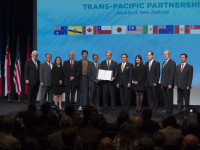The trade battle between Canada and the U.S. took a brief break last week as hours before the Trump tariffs were scheduled to take effect, President Trump agreed to a 30 day delay in return for various border measures. That brought a sigh of relief but no real sense that the issue is over. Indeed, quite the opposite – as future battles over tariffs and other measures appear very likely. Professor Richard Gold of McGill University’s Faculty of Law specializes in intellectual property. On last week’s Law Bytes episode, I referenced his proposal to consider suspending patents in key sectors such as pharmaceuticals and AI as a mechanism to counter US pressure. He joins me on the Law Bytes podcast to expand on his idea, explaining why there would be benefits for Canadian firms and frustration on U.S. firms that could spark domestic support to counter potential measures targeting Canada.
Post Tagged with: "IP"
Standing on a Shaky Foundation: What Lies Behind The Near-Impossible Challenge of Updating Canada’s Outdated Cancon Rules
Canadian Heritage Minister Pablo Rodriguez, who is hosting a culture summit this week in Ottawa, has said that he is open to modernizing the definition of Canadian content and that he is “open to all kinds of suggestions and ideas.” I’ve devoted many posts to the Cancon definition issue (even creating a Cancon quiz), noting that the current system is a poor proxy for “telling Canadian stories.” This system matters since the government’s Internet regulation policies are ostensibly designed to support Canadian content, but if the existing definitions don’t do that, they cannot reasonably be expected to achieve their objectives.
While I’m supportive of Rodriguez opening the door to reform, I have my doubts the government will make any significant changes to the current system. The challenge is that Cancon policy stands on a shaky foundation that is really three policies in one: an economic policy, a cultural policy, and an intellectual property policy. These three policies are often at odds with one another and used by politicians and lobby groups interchangeably to justify mandated contributions, content regulation, and foreign ownership restrictions. When the data doesn’t support one of the policies, they simply shift the discussion to one of the other policy objectives.
The Broadcasting Act Blunder, Day 14: The Risk to Canadian Ownership of Intellectual Property
The Broadcasting Act blunder series has previously examined Bill C-10’s enormous cost to the foundational elements of Canadian broadcasting policy including the beginning of the end of Canadian ownership and control requirements and how it downgrades the role of Canadians in their own programming. There is another significant cost that comes from a bill that Andrew Coyne of the Globe and Mail describes as “one of the most radical expansions of state regulation in Canadian history.” At a time when the government has emphasized the importance of intellectual property, the bill opens the door to less Canadian control and ownership over its IP.
The LawBytes Podcast, Episode 23: The WIPO BRIP Database – Rick Shera on the MEGA Experience and the Dangers of False IP Claims
The last episode of Season One of the Lawbytes podcast (new episodes will resume in September) returns to WIPO, the World Intellectual Property Organization and its proposed BRIP database. The BRIP database, which stands for Building Respect for Intellectual Property, will be a database of allegedly infringing websites. While some of the details remain sketchy, the basics are that BRIP will be a database of allegedly infringing websites that could be used by advertisers to stop advertising on those sites, payment providers to stop service, or even site blocking initiatives to mandate ISP blocking. Yet the BRIP database currently envisions the possibility of lobby groups such as the movie and music associations inserting sites in the database with no oversight, no review, and not even any transparent standards.
That approach caught the attention of Rick Shera, a lawyer in New Zealand with Lowndes Jordan and one of that country’s leading IP and Internet law experts. Rick posted a Twitter stream on the risks associated with false IP accusations, speaking from the experience of one of his clients. He joins me on the podcast this week to discuss the experience of MEGA and the risks of false IP claims.
Canadian Government Consults on Expanding Pacific Trade Treaty to UK, Taiwan, South Korea, and Thailand
The Canadian government has launched a public consultation on expanding the Comprehensive and Progressive Agreement for Trans-Pacific Partnership (CPTPP, formerly TPP) to other countries, specifically citing the UK, Taiwan, South Korea, and Thailand. The consultation could raise significant concerns as the UK would be the first non-Pacific country in the agreement and Taiwan could spark a response from China. Moreover, opening the agreement to new countries must likely factor in the possibility that the U.S. might want to re-enter the agreement if there is a change in administration in 2020.











